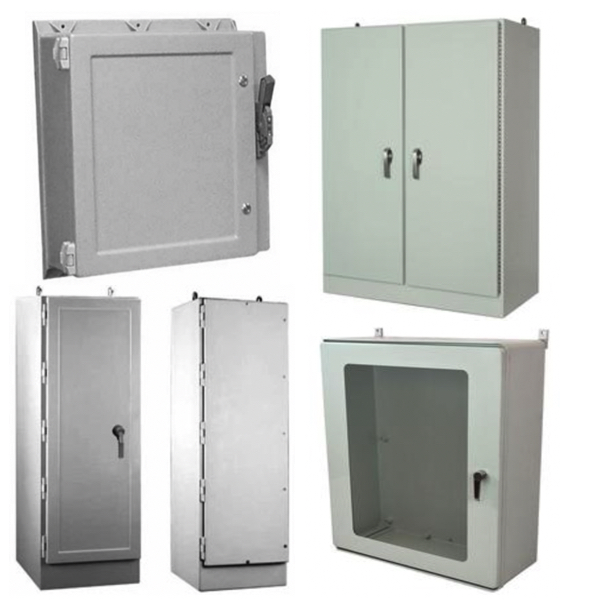Fiberglass Electrical Enclosures

Fiberglass electrical enclosures are designed to protect electrical and electronic equipment in harsh industrial, outdoor, and corrosive environments. Constructed from reinforced fiberglass materials, these enclosures offer excellent resistance to corrosion, moisture, dust, and chemical exposure while maintaining strong impact durability. Their non-metallic construction also makes them inherently non-conductive, adding an extra layer of safety in applications involving high voltage or sensitive electronics.
Many fiberglass enclosures are engineered to meet stringent NEMA ratings, ensuring reliable protection against environmental hazards such as water ingress, airborne contaminants, and temperature fluctuations. Their lightweight yet rigid construction simplifies installation while maintaining structural integrity. Threaded brass inserts are commonly integrated into fiberglass enclosures to allow secure mounting of internal components, panels, and accessories without compromising enclosure strength. Modern fiberglass enclosure designs often utilize CAD-based engineering to optimize internal layouts and mounting compatibility. This approach supports flexibility across a wide range of electrical applications while maintaining a clean, functional exterior. Fiberglass enclosures are widely used in industrial processing, chemical facilities, outdoor installations, and other demanding environments where metal enclosures may be susceptible to corrosion or conductivity concerns.
FAQs
Q: What features allow fiberglass electrical enclosures to protect equipment from damage?
Fiberglass electrical enclosures protect equipment through corrosion resistance, UV stability, impact resistance, and compliance with NEMA ratings for dust and water protection. Their non-conductive properties and resistance to temperature variation make them suitable for outdoor and high-voltage applications.
Q: Are fiberglass electrical enclosures suitable for outdoor use?
Yes, fiberglass enclosures are commonly used outdoors due to their resistance to UV exposure, moisture, corrosion, and environmental degradation.
Q: What are threaded brass inserts used for in fiberglass enclosures?
Threaded brass inserts provide durable mounting points for internal panels, accessories, and components, allowing secure installation without damaging the fiberglass structure.
Q: How do fiberglass enclosures compare to metal enclosures?
Fiberglass enclosures offer superior corrosion resistance, non-conductivity, and lighter weight compared to metal enclosures, making them ideal for harsh or corrosive environments.
Q: What industries commonly use fiberglass electrical enclosures?
Fiberglass enclosures are widely used in industrial manufacturing, chemical processing, water treatment, outdoor infrastructure, and other environments where corrosion resistance and electrical insulation are required.
Why Buy Fiberglass Electrical Enclosures for Superior Protection from RSP Supply
RSP Supply offers a broad selection of fiberglass electrical enclosures from trusted manufacturers such as Allied Moulded, Hoffman, and Stahlin. Our enclosures are designed to meet NEMA standards and support reliable equipment protection in demanding environments. Customers rely on RSP Supply for technical expertise, consistent product quality, and enclosure solutions that support long-term system performance and safety.

